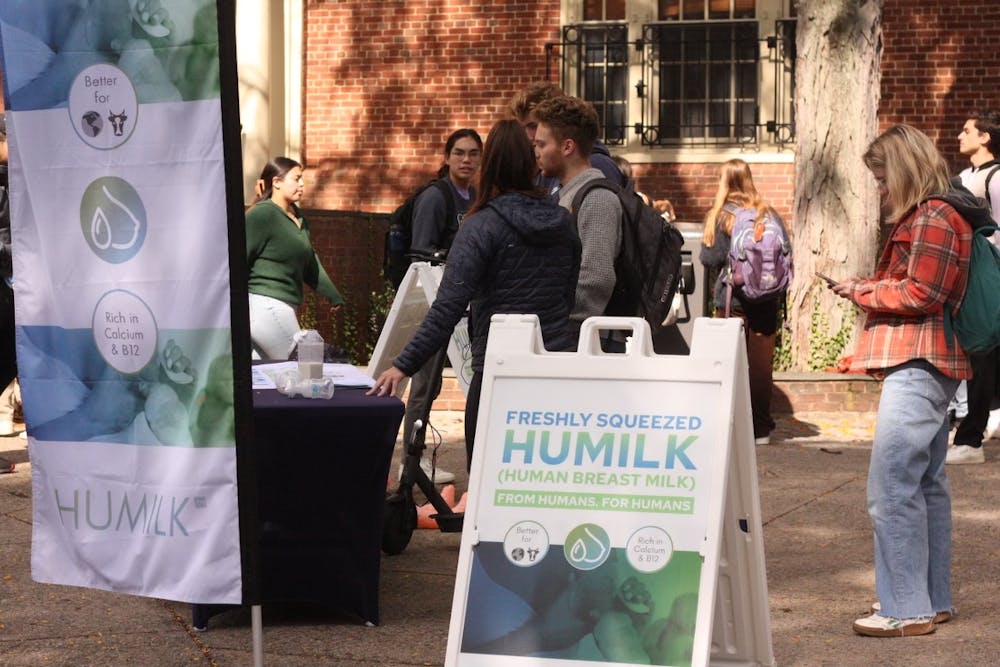On Monday, it was dog meat. On Tuesday, it was “HuMilk” — or, supposedly, human breast milk.
At a table at the bottom of Wriston Quadrangle last week, volunteers handed out “samples” to willing students and had conversations with others.
The samples? Oat milk and vegan meat. The table? An event hosted by Allied Scholars for Animal Protection, a national advocacy group with chapters at 13 campuses nationally, including Brown. The goal? To start a conversation and inspire people to eliminate animal products from their diets.
“The breast milk and dog meat stands are partly for the shock factor,” Benny Smith ’23, project coordinator for ASAP, told The Herald. “If you just make a poster that says go vegan, people don’t talk to you. This gets people to talk to you.”
Monday’s “dog meat” stand tapped into students’ compassion for animals — starting with man’s best friend.
“People like dogs, and they don’t like the idea of their companion animal being slaughtered,” Smith said. “Pigs are even more intelligent and emotional than dogs. And they’re tortured for their entire lives on factory farms. The same stuff happens to cows, chickens and fish … horrific abuse that happens to tens of billions of animals every year.”
The next day, along with founder Faraz Harsini and Natalie Fulton, a Youtube content creator and animal rights activist, Smith spoke with passing students about the “atrocities” of dairy, egg and meat farms, presenting arguments from different angles.
“What we are saying is that we should treat animals equally,” Harsini told The Herald. “We should either eat all of them or none of them. So if you care for dogs, then let’s treat other animals the same way.”
Students responded differently to Monday and Tuesday’s tables. Gabriel Herrera ’25 told The Herald that he “loves dogs” and still eats meat.
“I guess it’s a fair comparison, but I just think they can go about it a different way,” Herrera said. “I would want to go plant-based for more positive reasons rather than ‘stop hurting animals.’ And I feel like phrasing it as a negative like that is less constructive than, ‘Let’s build a more sustainable world.’”
Harsini, who has a PhD in biomedical sciences, pointed to greenhouse gas emissions, infectious disease transmission, antibiotic resistance and individual health as some of the most harmful outcomes from the meat, egg and dairy industries.
“So long as we are not changing our food system, we are going to have a lot of environmental issues. We’re going to have a lot of public health crises,” Harsini said. “On the individual level, the number one cause of death (in the United States) is cardiovascular disease, and then you have cancer and diabetes. All of these diseases are preventable, for the most part. And they come back to diet.”
Diabetes ranks eighth on the list of leading causes of deaths, according to the Centers for Disease Control and Prevention.
But most importantly, a whole food, plant-based diet is “one of the best ways to prevent needless animal suffering,” Harsini said.
Marcello Calamandrei ’26 said he appreciated ASAP’s efforts to raise awareness about the conditions of factory farming, even if their tactic is “bait-y.”
“If you want people to engage with really serious things like the ultra-confinement of animals, straight-forwardness is oftentimes an ineffective strategy,” said Calamandrei, who follows a mostly plant-based diet. “They’re trying to start a conversation about food.”
Last week, those conversations lasted 20 minutes or more, in some cases. One student talked to Fulton about morality, animal suffering and plant-based diets, trading arguments, rhetorical questions and hypotheticals.
“I know that nobody can prove me wrong,” Fulton told the student. “I’ve never had anyone present a good argument against veganism.”
“I think it’s just a matter of being so firmly entrenched in these practices,” the student responded. “Especially when most people around me are generally pretty good people — to say that they’re doing something so morally wrong … that’s hard for me to accept.”
The Brown chapter of ASAP was previously the Brown Animal Rights Coalition, according to Lily Randell ’25, a member of the club’s leadership team. After this year’s rebrand, the chapter has been “hosting” the national organization for talks and events. The dog meat and breast milk tables were executed by the national organization.
Most students who spoke to The Herald said they thought the tables were funny, or were just curious about the organization.
“Between the Kosher kitchen and (allergen-aware kitchen), this is the semester for food discourse on campus,” Calamandrei said.
Haley Sandlow is a contributing editor covering science and research. She is a junior from Chicago, Illinois studying English and French.





